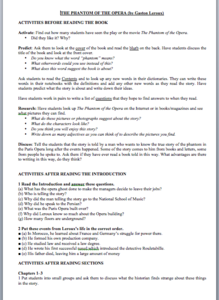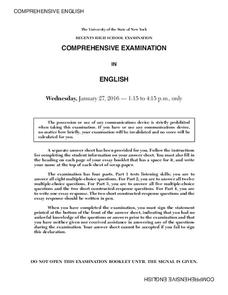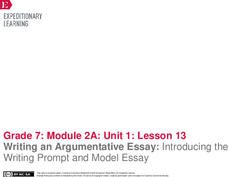Prestwick House
The Poetry of Bob Dylan
Bob Dylan's selection as the 2016 winner of the Nobel Prize for Literature, the first songwriter ever to receive the honor, has focused the attention of a new generation on the work of the legendary artist. Class members analyze the...
Curated OER
A P Literary Terms
Is a list of literary terms found frequently on AP English exams of value to test takers? Now there's a rhetorical question. Here's a list that provides definitions for everything from allegory to vernacular. To say the list is of value...
Busy Teacher
The Phantom of the Opera
It's no masquerade! If Gaston Leroux's The Phantom of the Opera is part of your curriculum, check out this three-page packet loaded with suggestions for before, during, and after reading activities.
Read Works
Columbus Reports on His First Voyage, 1493
What did Christopher Columbus have to say about his exploration of the Caribbean? Young historians have a chance to examine Columbus' own words about his voyage to Cuba and Santo Domingo. After reading Columbus' report, pupils respond to...
Digital Writing and Research Lab's – Lesson Plans
Teaching Close Reading through Short Composition/Revision
This activity may have writers evaluate short compositions, but their subjects are quite tall: great Americans. Pupils read one another's compositions and closely examine how specific phrases and diction contribute to shaping American...
Breaking News English
The World Is 0.28% More Peaceful Than a Year Ago
Some days, the world seems like it is becoming darker, but research suggests that the world might actually be becoming a more peaceful place. An informational reading passage accompanied by a series of activities builds English language...
American Press Institute
In the Newsroom: The Fairness Formula
Reporting the news is easy, right? Think again! Show young scholars the difficult choices journalists make every day through a lesson that includes reading, writing, and discussion elements. Individuals compare the language and sources...
University of North Carolina
Plagiarism
As many unfortunate journalists have learned, taking someone else's ideas and passing them off as your own is never a good idea. It's called plagiarism—and it's a big deal. Thankfully, a handout helps writers learn how to avoid...
University of North Carolina
Policy Brief
Not all writing assignments take the form of an essay. When it comes to politics, it's all about policy briefs. This type of writing is the topic of an informative handout, which is part of a larger series on specific writing...
University of North Carolina
Paragraph Development
There's no set length for a good paragraph, but the short block of text should contain key components. A handout on paragraphs, the 12th in a series of 24, outlines a five-step process for paragraph development. Additionally, the handout...
Great Books Foundation
Rattlesnakes
John Muir may be a friend to the natural world, but as a short reading passage confirms, he is no friend to rattlesnakes. As young readers learn about Muir's encounters with the dangerous creatures, they answer four comprehension...
New York State Education Department
Comprehensive English Examination: January 2016
Poetry and prose often have more in common than it initially appears. A sample comprehensive English exam has test-takers compare and contrast two passages to answer short response questions. The exam, which is part of a larger set of...
Reed Novel Studies
From The Mixed Up Files Of Mrs. Basil E. Frankweiler: Novel Study
Claudia Kincaid decides to run away to bring some excitement to her life, but she never expects the adventure she finds. A helpful study guide takes readers through the novel From the Mixed Up Files of Mrs. Basil E. Frankweiler....
Reed Novel Studies
Old Yeller: Novel Study
Fred Gipson's Old Yeller tells of a stray yellow dog who becomes the best friend a boy could ever have. While reading the novel, learners complete sentences with new vocabulary words, answer comprehension questions, and create...
Meadows Center for Preventing Educational Risk, University of Texas at Austin
Lesson 5 - R-Controlled Syllables
Put on your pirate hat and get ready to teach r-controlled syllables. Learners practice using words that contain ar, or, er, ir, and ur. Instructors model how to decode words to isolate vowel teams, as well as combine r-controlled sounds...
College Board
2018 AP® English Language and Composition Free-Response Questions
Discussions of eminent domain sometimes trigger strong emotions. A set of free-response questions from the 2019 AP® English Language and Composition exam tackles the concept with a series of persuasive pieces. Learners analyze all six...
PBS
Exploring the Drive to Create in Frankenstein
Is it hubris that drives the creative process? Is it the desire to be remembered long past death? An interactive asks readers of Mary Shelley's novel Frankenstein and Percy Shelley's poem "Ozymandias" to consider what this wife and...
EngageNY
Establishing Structures for Reading: Gathering Evidence about Salva’s and Nya’s Points of View (Reread Chapters 1 and 2)
Readers practice gathering textual evidence to support their understanding of character point of view in A Long Walk to Water by Linda Sue Park. Working with partners, they complete a Gathering Evidence graphic organizer and engage in...
EngageNY
Building Background Knowledge: The Lost Boys of Sudan
Get deep! Teach scholars how to make connections between texts to deepen their understanding of a topic. Using the resource, pupils read and annotate a short informational text about Sudan's Civil War and refugee crisis. Next, they...
EngageNY
Performance Task: Two-Voice Poem Readings
Eye contact, volume, and pronunciation are key ingredients to a successful presentation. Pupils present their two-voice poems to the class with their poetry reading partners. Next, to wrap up the unit, scholars use a worksheet to reflect...
EngageNY
Mid-Unit Assessment: Evidence, Ideas, and Interactions in “Why Couldn’t Snow White Be Chinese?”
The class is halfway there! Pupils complete a mid-unit assessment by answering questions in Evidence, Ideas, and Interactions in Why Couldn’t Snow White Be Chinese? Readers then work with partners to analyze the 2010 Census: United...
EngageNY
Writing an Argumentative Essay: Introducing the Writing Prompt and Model Essay
Pupils begin the writing process in preparation for an end-of-unit essay based on Katherine Paterson's Lyddie. To get started, they read and discuss a model essay and learn about the similarities and differences between argumentative and...
EngageNY
End of Unit Assessment, Part 1, Continued: Revising Vocabulary and Conventions Based on Feedback
Writers align their position papers with the last two rows in the rubric. After looking at the rubric rows for vocabulary and conventions along with feedback on their papers, class members revise their essays. They then look at the...
EngageNY
Forming a Research-Based Claim: Analyzing Risks and Benefits for Stakeholder
Welcome to the World Café, where lively debate is on the menu! Scholars participate in the World Café protocol, moving between discussion groups to decide if the American Academy of Pediatrics should increase its adolescent screen time...
Other popular searches
- Monumental Style Art
- Gothic Art Style
- Warhol Style Portrait Art
- X Ray Style Art
- Styles of Art
- Woodlands Style Art
- Pop Art Style
























